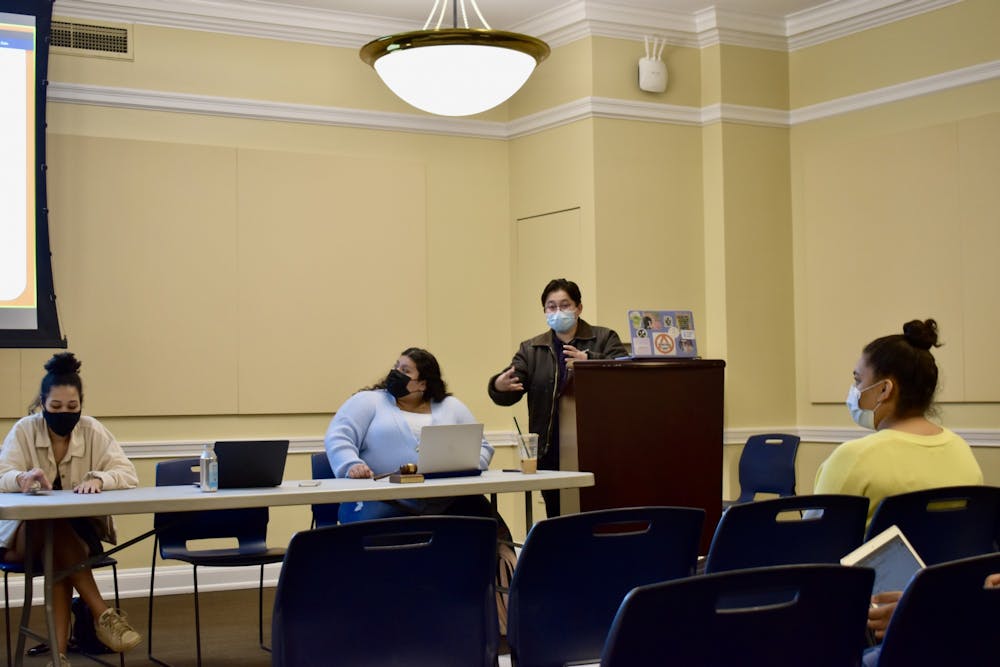Abel Liu, president of Student Council and fourth-year College student, presented his vision for the future of Student Council’s Support and Access Services Branch during the organization’s general body meeting Tuesday.
Support and Access Services was officially established in March 2021 via constitutional referendum. Led by third-year College student Adrian Mamaril, the branch includes seven different programs — the Community Food Pantry, Accommodations Access Fund, U.Va. Mutual Aid, Aetna Insurance Support Fund, Next Steps Fund, Student Legal Services and the Textbook Access Office.
Student Council members created the branch to support students using the “extraordinary” surplus funding generated while students were not present on Grounds due to the pandemic. Support and Access Services is now a provider of many material needs to students.
Liu said he views the branch as crucial in gaining support for Student Council from students.
“Before this year, groups really did not buy into what we were doing as Student Council because they had no reason to see tangible authority over their lives,” Liu said.
Liu cited the actions of student governments at other colleges and universities — such as Michigan State University, the University of California-Davis and the University of Maryland — as further reasons to continue with service-based student government initiatives. Liu explained the ways in which other student governments have provided services like food pantries, bus services, healthcare support and other material goods to students at no cost. While Student Council already has its own version of these service-based programs, Liu emphasized the importance of continuing these efforts.
Liu urged Student Council to continue its commitment to service-based initiatives to keep up with recent trends and to remain a leader in student self-governance.
“The question really remains, are we really a leader in self governance if we're not leading on what I would argue is one of the most materially important trends in student government over the last few years?” Liu said.
Liu and his administration are in conversation with University administration to secure permanent funding and endowment for the Support and Access Services Branch. Liu said that the collective $330,000 distributed by the branch within the last year provides proof of the need for its services.
Liu sees movement away from sole reliance on student fees as crucial for the stability of this branch moving forward. To this end, members of Student Council established a Capital Campaign Ad-Hoc Committee in December with the intent of raising $5 million in endowment funds to help finance the branch.
Originally, Liu viewed the services provided by Student Council as a temporary solution for a problem that could be better solved by the University. Liu now believes these services — such as the Community Food Pantry and U.Va. Mutual Aid — have since been improved, as they more closely involve the groups affected.
“I’ve realized that if we are able to have the students closest to the need to distribute these services, the outcomes will be the best,” Liu said.
The greatest hurdle Mamaril identified in operating the branch is informing students about available resources.
“One of the hardest things really is getting the word out there,” Mamaril said.
In explaining the future of the branch, Liu classified his goals in three main categories — permanence, stability and quality.
Liu’s main concern is ensuring that funds are not withdrawn from the branch at volumes that are not sustainable. To prevent excessive withdrawals, Liu suggested implementing a series of divestment guidelines, such as limiting the amount of funding that can be withdrawn at a time and requiring a large portion of the divestment to be spent directly on Support and Access services, such as providing material goods to students in need.
Quality, Liu said, involves three central tenets — Student Engagement staff support, integration within the larger University network of support “Hoo Needs Help” and the assurance that Student Council office space serves as a physical space in destigmatizing resource distribution. Hoo Needs Help is a University website that provides resources for students who need assistance with unexpected emergency expenses. In the future, Liu hopes the Support and Access Services branch can supplement the resources already offered by Hoo Needs Help.
The final aspect of quality involves creating a physical space that destigmatizes the distribution of resources. Liu proposed the inclusion of reusable, aesthetically pleasing bags in the food pantry, a solution arising out of a conversation had with a Student Success Expert, a person consulted for advice on utilizing the Student Council space to destigmatize resource distribution.
Liu hopes to see the Student Support and Access Services branch become a regular part of the lives of students who need it, and to see the branch sustained for years to come.
“It’s not charity — it really is solidarity across the student body,” Liu said.
The next Student Council meeting will be held in a hybrid format Tuesday, Mar. 1. The meeting will be held in the South Meeting Room in Newcomb Hall, and the link can be accessed on Student Council’s website.







